As the devastating war in Syria winds down and the so-called Islamic State terrorists are being zeroed in on in their last small bastion on the border with Iraq, Damascus is looking to turn a new page; it is in dire need of foreign investment to reconstruct the country.
Iran was one of the first allies that shored up the government of President Bashar al Assad as anti-government protests started in 2011 and stayed with him as demonstrations morphed into an all-out war.
Eight years on, Iran continues its support and wants to help Syria rebuild and start again. “Naturally now that it’s time to rebuild, we will be with Syrians,” reiterated Iranian first Vice President Eshaq Jahangiri during a recent joint business forum between Syria and Iran that was held in Damascus Dama Rose Hotel late January.
Tehran has shown its preparedness by dispatching a business delegation, led by Gholam Hossein Shafei, president of Iran Chamber of Commerce, Industries, Mines and Agriculture (ICCIMA) to participate in the forum and put on the table all it can offer. Shafei was accompanied by Keyvan Kashefi, head of joint Iran-Syria Economic Committee.
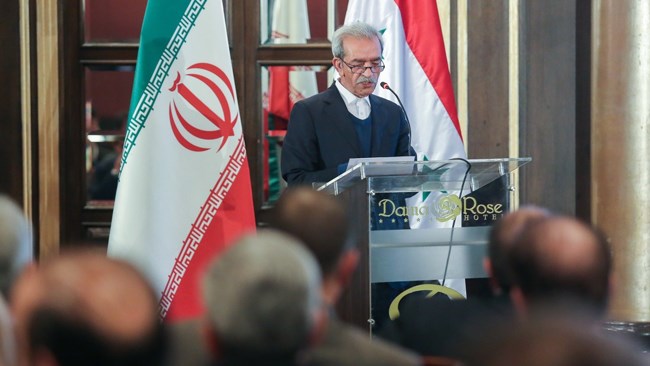
Gholam Hossein Shafei, president of Iran Chamber of Commerce, Industries, Mines and Agriculture (ICCIMA) addressing the joint Syria-Iran business forum in Damascus in January (Photo: fvpresident.ir)
Iranian household appliances, textile, plastic and polymer and tapware producers as well as representatives of construction and petrochemical firms were all present at the forum in a bid to gauge investment and joint production opportunities.
“The situation in Syria has provided some opportunities for Iranian clothing manufacturers to rebuild the country’s destroyed market,” Emaduddin Kabiri, a member of Iranian Association of Clothing Industry (IAOCI) told Iran Chamber Newsroom on the sidelines of joint Syria-Iran business forum.
He says clothes makers in Iran are eager to bring in their experiences and technologies to rebuild Syria’s infrastructure in this sector.
Syrian textile industry was for years the dominant supplier of regional markets, beating rivals such as Iran and Turkey. However, the war has taken its toll. Kabiri is well aware of Syria’s past records and stresses that Iranian clothing producers don’t want to “compete” with textile brands in the Arab country.
What Iranian textile companies can do, according to the businessman, is to fill the gaps where there isn’t any competition. “We need to fill those gaps based on the potentials of our own industries,” he emphasized.
Kabiri further said that Iranian manufacturers are ready for joint ventures, the idea of which was floated by president of the Iranian private sector Shafei in his address to the forum where he outlined the six principle areas that Iranian private companies can operate in Syria.
Official business relations between Iran and Syria date back to 1996 when the two countries held their first joint commission in Damascus. Even one year after the initial disturbances, Tehran and Damascus ratified and implemented a Free Trade Agreement (FTA) in 2012, under which Iranian and Syrian products could be exported at a 4% tariff. Syria was the first country to sign an FTA with Iran. But as war emerged, the business relations were nearly cut.
Just shortly before the Syrian war in 2011, mutual trade volume hit a record of 545,000 dollars with Iranian exports worth of 515,000 dollars. Iran’s trade surplus was nearly 500,000 dollars.
Even when the war was raging, Iran was the third largest exporter of goods and commodities to Syria after Saudi Arabia and the United Arab Emirates (UAE), according to the data published in 2016 by Iran Trade Promotion Organization (TPO). “Iran’s share of the market stood at 8.3%,” the organization said.
However, two things have been standing in the way of expansion of Iran’s business relations with Syria: lack of banking relations and difficult and long transit routes.
Tehran has plans to work out ways to resolve those problems: Governor of Central Bank of Iran Abdolnaser Hemmati went to Syria as part of the government delegation in a bid to set up financial channels that wouldn’t use the US dollar in a way to circumvent US sanctions that have been imposed on both nations.
Easing financial transactions for Iranian exporters to repatriate their money has been one of the key issues among 11 Memoranda of Understanding and Long-term Strategic Economic Cooperation between Iran and Syria that were signed in Damascus last month.
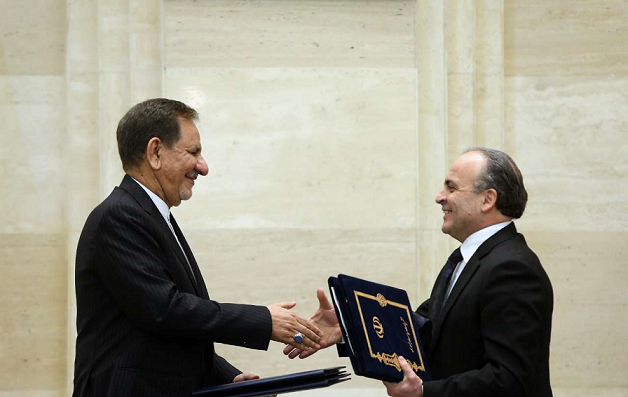
Iranian First Vice President Eshaq Jahangiri (left) shakes hands with Syrian Prime Minister Emad Khamis after signing MoUs in Damascus in Junuary (Photo: IRNA, Ehsan Naderipour)
Before the war in Syria, Iraq was also in the midst of an occupation and war so Tehran needed to seek alternative ways: via land through Turkey and via sea from Iran’s Bandar Abbas in the Persian Gulf to Lattakia Port in the Mediterranean – two routes that led to huge increases in costs and consequently the finished price for the Syrian customer.
Iran Chamber of Commerce has been constantly calling for resumption of export by land through Iraq as well as creation of a trilateral shipping company between Iran, Iraq and Syria to fast-track goods transit.
Keyvan Kashefi, who is the Iranian chairman of the joint Iran-Syria economic committee told Iran Chamber Newsroom early January that Iraq route will be opened as soon as the final battles to clear the remaining pockets of IS terrorists on Iraq-Syria border are finalized. The three countries are also weighing rail transit options.
Here are areas in which Iran can be the leading foreign investor in Syria:
Household Appliances
Founded some 80 years ago in Iran, this industry has been going through ups and downs in producing high quality products. Recently, Iranian home appliances producers have been able to not only meet the domestic needs but also have been eyeing expansion into regional markets. Iranian fridges are the most popular appliances in Iraq and Afghanistan.
Although Syria can “open new horizons for Iranian producers”, as put by Sharareh Kamrani, Planning Deputy at Association of Industries of Household Appliances of Iran (IHAI), foraying into the Syrian market is not that easy. “Syria doesn’t allow import of built appliances despite the Free Trade Agreement,” Kamrani lamented in an interview with Iran Chamber Newsroom in Damascus.
“Unfortunately in spite of Syria’s thirst for Iranian household appliances and the willingness of Iranian producers, we haven’t been able to make any headway,” she regretted, stressing that Syrian market is inundated with counterfeit Turkish products.
However, she didn’t rule out Iranian direct or joint investment in this sector, what Iran private sector has been offering.
Construction materials
The eight-year war has razed to the ground many buildings across Syria, that is, cement and other construction materials, used inside homes and offices, are highly needed. Syrian Industry Minister Mohammad Maen Zein-al-Abidin Jazba told the Iranian private sector delegation that his country is in dire need of not only cement but also petrochemical companies.
“Constructing petrochemical companies with Iranian firms is highly important because such facilities provide the necessary material for a hundred more industries,” he emphasized.
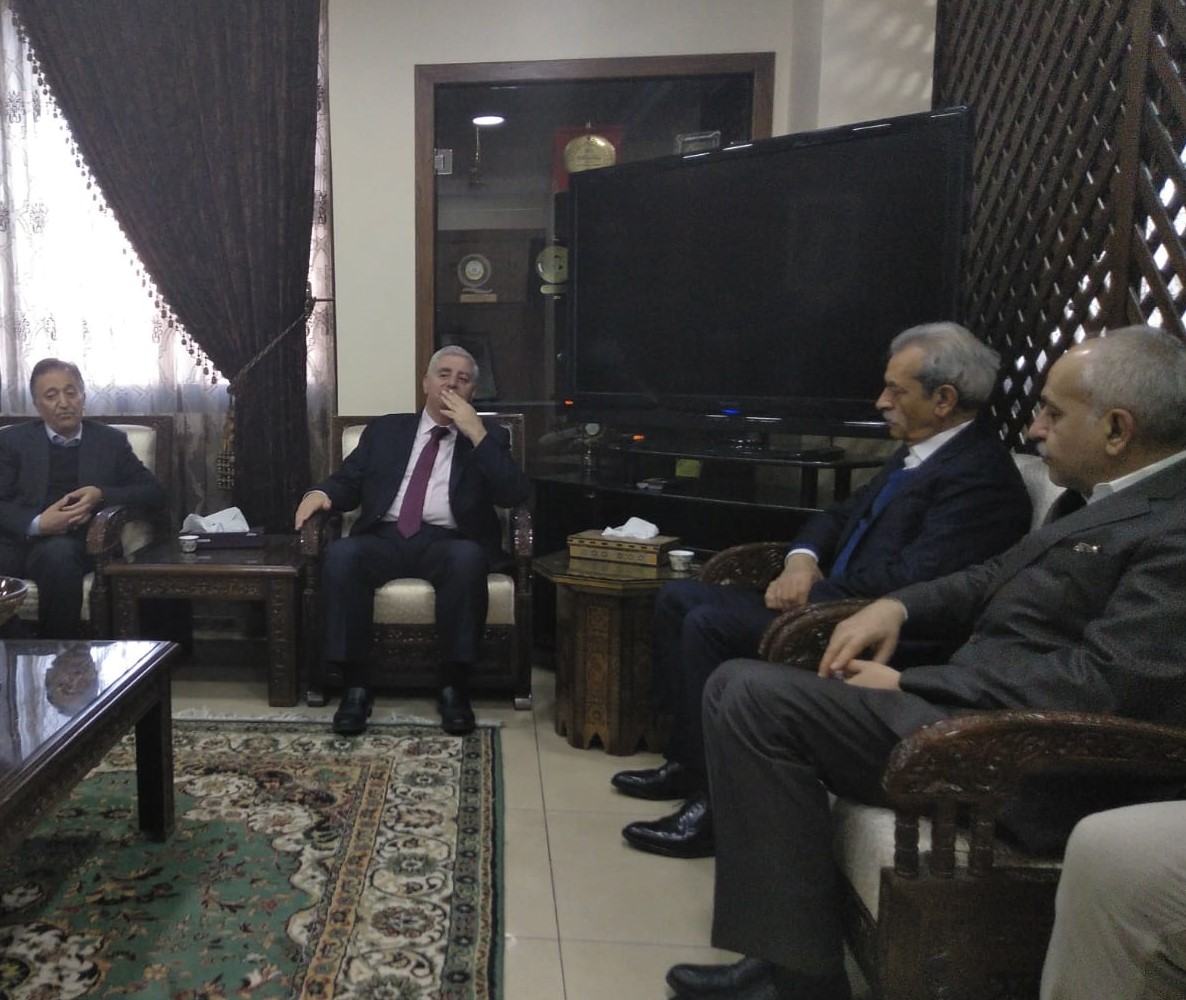
Syrian Industry Minister Mohammad Maen Zein-al-Abidin Jazba meeting Iran private sector delegation in Damascus in January
Biuk Sahaf Amin, Chairman of the board of directors at Iran National Plastic and Polymer Industrial Association (INPIA), boasts Iran’s highly-capable polymer industry, saying factories are producing High Density Polyethylene pipes (HDPE) as thick as 2,400 millimeters (94.4 inches). “We are the plastic and polymer hub of the Middle East,” he told Iran Chamber Newsroom in Damascus.
He believes Iranian plastic manufacturers can provide all the necessary pipes and Unplasticized Poly Vinyl Chloride (uPVC) windows used in new buildings.
According to the businessman, Iran’s plastic and polymer products are very high quality and low in price and can easily beat competitors such as Turkey. “Our prices are lower because we have raw minerals feeding petrochemical companies but Turkey buys those raw minerals from us, hence their products are much more expensive,” he added.
Sahaf Amin stresses that Iranian plastic producers are in talks with Syrian businesses to supply them with doors, windows and PVC profiles.
Power facilities
Iran’s giant infrastructure holding MAPNA Group was constructing power plants in Syria before and during the war.
Tishreen Combined Cycle Power Plant, south of Damascus, and Jandar Combined Cycle plant, some 30 kilometers south of the central city of Homs are the two plants developed by Iran’s MAPNA so far.

A view of Jandar 660MW power plant near Homs in central Syria (Photo: Technical Office for Engineering & Contracting in Syria)
The group of companies also officially kicked off work on Latakia 540-megawatt power plant last January during a ceremony attended by Iranian Energy Minister Reza Ardakanian and Syrian Electricity Minister Mohammad Zuhair Kharboutli.
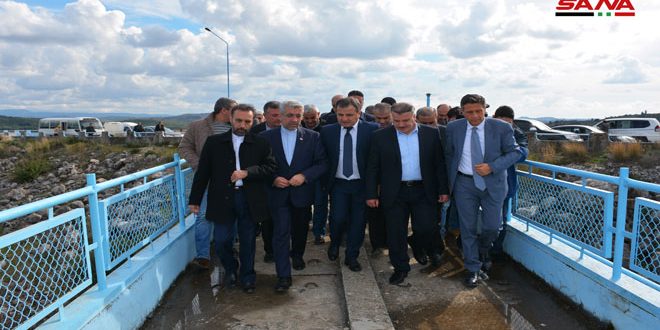
Iran Energy Minister Reza Ardakanian (2nd left) visits Latakia power plant construction site on Tuesday, 29 January (Photo: SANA)
Iran’s Kurdistan region: shortest route
As part of Iran Chamber of Commerce’s policy, some local chambers are chosen to lead economic activities with certain countries. For example, Chamber of Commerce of Sanandaj, provincial capital of Kurdistan province, has been nominated the leading local chamber of commerce to develop ties with Syria.
Iran’s Kurdistan is only 400 kilometers away from Syria and can serve as an important transit hub for the export of Iranian goods to the Arab country via Iraq. Hamed Ranjbar, a member of Sanandaj Chamber of Commerce, who represented this local chamber in Syria, believes Kurdish firms producing cement, PVC profiles, uPVC windows and agri-foods are ready to export their products to Syria.
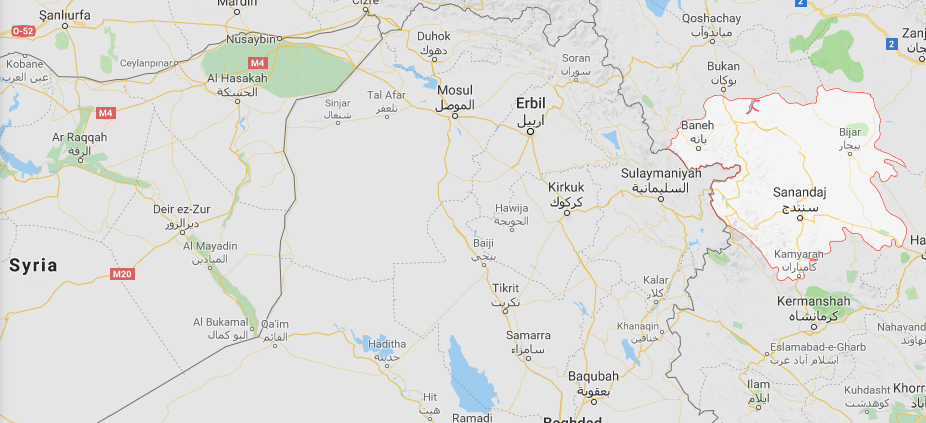
A screenshot of Iran's Kurdistan Province (right, demarked by red lines) and its proximity with Syria via Iraq
However, apart from partial insecurity, goods transit via Iraq proves difficult because the country hasn’t joined the TIR Convention, an international transport and transit system that harmonizes transit of commodities between countries.
Despite all the outlined difficulties, Syria has opened its doors to Iranian firms, public or private, as part of the Syrian governemnt's good-will gesture to thank, in a practical manner, Iran's crucial support during all these years.
Last December, Syrian Economy and Foreign Trade Minister Mohammed Samer al-Khalil paid an official visit to Iran and held talks with a wide range of Iranian officials as well as the ICCIMA president and private Iranian firms. He was here to woo Iranian investment o joint venture because "there are huge opportunities for Iranian companies to rebuild the war-torn country."
Watch video: Syrian Economy Minister invites Iranian companies to rebuild country
Business ties gain momentum
A year ago, the ICCIMA created a joint Iran-Syria Economic Committee, chaired by Keyvan Kashfei and comprised of 10 Iranian businessmen, in a bid to push for further economic cooperation between the two countries' private sectors and help Iran's private companies take a bigger share of Syria's 400-billion-dollar reconstruction market.
The committee, that's been actively shuttling between Iran and Syria since its creation, is expanding the scope of Iran's economic operations in Syria beyond the capital Damascus. Recently, it toured the city of Aleppo to visit the damaged facilities and evaluate Iranian contribution to reconstruct them.
However, what was missing was the Syrian par of the Iranian committee. During the joint business forum in Damascus, finally Syrian-Iran joint Economic Committee came to life and Syrian businessman, Omran Shaban, was chosen to head the 10-member committee that is aimed at facilitate smoother cooperation between the two countries' private sectors and boost their bilateral trade.
Keyvan Kashefi (left) shakes hands with Omran Shaban after signing a document about creation of Syria-Iran joint Economic Committee in Damascus in January
Now that both countries have joint economic committees, they can move foreward to create their joint chamber of commerce.
Iran private sector has shown it's very serious in upgrading economic ties with Syria. The ICCIMA has rented an 11-storey building at the heart of the Syrian capital, that is, Damascus Free Zone, to provide a physical base for Iranian businessses that are eager to engage with Syria.
Bringing business ties to the smae high level of political relations between Tehran and Damascus could lead to a strong geopolitical alliance between Iran and the important Arab country.